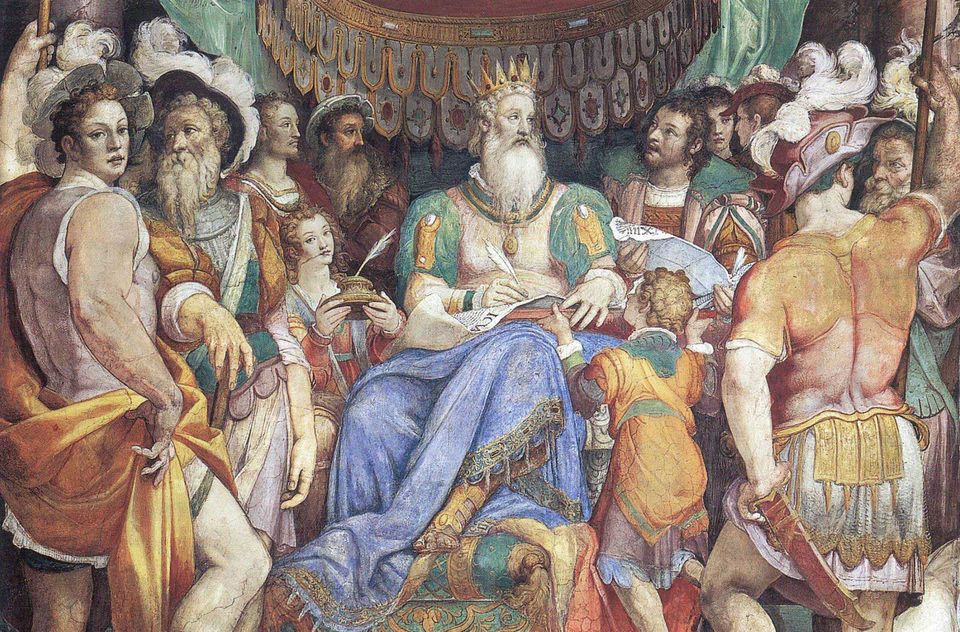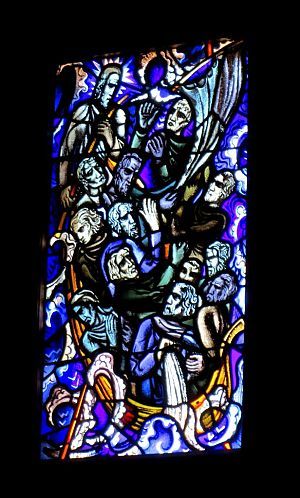
Riepster Light
After his victory over the Frisian king Radboud II, Charlemagne ordered that laws be put in writing everywhere. Not everyone cooperated with that....
Take a closer look
Various versions of the story have circulated, as so often happens with stories handed down orally for centuries. It was probably first written down by the last vicar of Zeerijp, who also served as the first pastor after the Reformation. He stood in the pulpit from 1555 to 1600, the last five years of which he served as pastor. His manuscript is unfortunately lost; the first surviving text is in the 1841 Geographical Dictionary by A.J. van der Aa. He describes the legend (slightly adapted) as follows:
"Emperor Charlemagne, after his victory over the Frisian king Radboud II, ordered that laws be put in writing everywhere. To this end, the Frisians appointed twelve expert persons, law scholars, called Wimoedes by them and Azen by the Normans.
These had to ...
Various versions of the story have circulated, as so often happens with stories handed down orally for centuries. It was probably first written down by the last vicar of Zeerijp, who also served as the first pastor after the Reformation. He stood in the pulpit from 1555 to 1600, the last five years of which he served as pastor. His manuscript is unfortunately lost; the first surviving text is in the 1841 Geographical Dictionary by A.J. van der Aa. He describes the legend (slightly adapted) as follows:
"Emperor Charlemagne, after his victory over the Frisian king Radboud II, ordered that laws be put in writing everywhere. To this end, the Frisians appointed twelve expert persons, law scholars, called Wimoedes by them and Azen by the Normans.
As initiates, they had to translate the holy language of the gods, which consisted mostly of rhymes and proverbs, from Old Frisian into Latin, and this translation would then serve as a guide. The Wimoedes refused: in their view, it was not permissible to put in writing what their ancestors had spoken in oracular language; nor did they want to submit to the newly introduced imperial laws, they were too far removed from their ancient manners and customs, to which they were particularly attached.
The emperor now presents them with a choice, to be done within seven days: beheaded, buried alive or deported in a rudderless ship. They choose the latter. Floating before God's weather and wind, one of the Wimoedes, namely Azing or Asega, relates that he had once heard in a sermon by Willebrord that Jesus Christ had appeared among them after his resurrection, at the prayers of his frightened friends, though the doors of the hall they were in were closed. He suggested that they too prayed to Jesus.
And lo and behold, while they were still bathing, a man appeared at the back of the ship, resting his hand on the crosier with which he steered the ship and so brought them back to the port from which they had set sail. When the thirteenth, with the twelve Wimoedes, to whom he was entirely similar in appearance, came ashore, he threw the log on the ground, where it immediately burned and then became a shining beacon for the sailors, until 't Zandt [the harbour of Zeerijp] clogged up, whereupon the burning wood disappeared and was replaced by a rich source of delicious fresh water. But from then on the devil burned a fire like a false lantern here on the dike, a great light, to deceive the sailors, as this light disappeared on approach.
The thirteenth taught the Wimoedes further. If they were now taught, they no longer saw the thirteenth. They chose the land law taught to them by Mary's son, and this collection of laws won the approval of the emperor and the pope both, and by this prompting of Jesus Christ, the otherwise stiff-necked Frisians got their laws in accordance with the emperor's desire. The much-feared Rijpster light is thus no other than the fire of the Evil One."
Statement
Actually, this legend does not belong specifically to Zeerijp, but the original 13th-century story explains the origin of Frisian laws. In it, Asega is not the name of a person but someone with knowledge of ancient (pagan and always orally transmitted) legislation. Wimoedes were the Frisians descended from a prince from India who is said to have founded Friesland. He was said to be the ancestor of all those who lived between the Lauwers and Weser rivers.
But whatever the case, it is the Riepster story that has been passed on to this day, and over the centuries the Riepster Light has been seen and described many more times.
Source: verhalenvangroningen
Header photo: Charlemagne
Photo: Stained-glass window in the Academiegebouw showing the legend of the Riepster Light, depicted by Johan Dijkstra.


